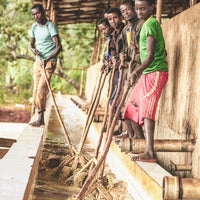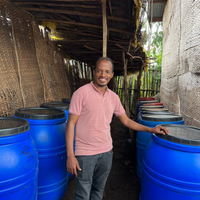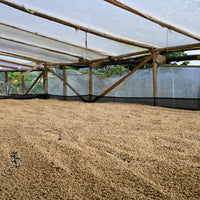Origin: Ethiopia
Region: Yirgacheffe
Sub region: Kebele (Village): Wegida
Farm: Mrs Nigist Girmachew - Jabanto Farmers Coffee Group
Altitude: 2108 meters above sea level
Variety: Kurume, 74110, 74112
Process: Natural
Tasting Notes: Juicy and sweet with notes of strawberry, apricot and mango.
Nigist Girmachew is one of the few young women in coffee, and has recently joined the Jabanto farmers coffee business group. Nigist had heard about Jabanto back in 2019 but had not obtained her competency certificate from the coffee and tea authority, thus unable to sell her coffee directly to an exporter or the international market. In 2022 she received the necessary documentation and began to export her own coffee under the Jabanto group, represented at an export level by Getu Bekele and G Broad PLC. It was through the Gemede family who are also members of Jabnato that she had enquired about joining Jabanto and was accepted into the group. She currently sells her coffee under her own name or as a consolidated blend under Jabanto. Nigist's coffee farm is located in Wegida village of Yirgacheffe county in a specific place called Dobi.
Not only is Nigist a hard working, dedicated and passionate female coffee farmer. She’s also the Matriarch of the family, raising her children and catering to family needs on a daily basis. The coffee trade and Nigist's ability to represent her own harvest is a significant step towards financial stability, and she’s currently working on diversifying family's livelihood by investing the income generated from coffee farming on a small retail shop in Dobi village.
Nigist receives technical support on coffee agronomy and post harvest handling practices from a local bureau of agriculture and G Broad Trading PLC, and this has resulted in quality and yield improvements year on year. Young coffee trees and moderate levels of shade in the farm have a great contribution to the flavor of the sun-dried natural coffee lot from Nigist. Ripe red cherries are dried for 18-21 days on a raised bed usually called an African raised bed. During all these days, cherry quality control continues. A total of 11 Kg of red coffee cherry per square meter is distributed on a drying bed made of Bamboo mat. To maintain uniform drying among beans, the coffee is turned around on the bed manually six times per day. The cherry is then covered with nylon mesh and plastic during the night time. Starting the 15th day, the trend of coffee bean moisture loss is monitored to pull the dried cherry off the bed if the coffee bean attains a moisture level between 9.5% and 10.5%. This natural coffee processing technique plus the complex interactions among soil, rainfall distribution, temperature, shade, and genetic makeup of varieties play the greatest role to affect the quality profile of a specific
coffee lot.
Jabanto farmers business group was established in 2018 with the help of G Broad PLC. An initial 29 smallholder coffee farmers from Gedeo zone founded the group in 2018 and the size of the group kept expanding over years - today there are 87 registered smallholder coffee farmers in the group. The group tries to produce different coffee types: regional lots, village level lots, single farmer lots, variety lots and processing lots. The collaboration between Bi-Lab and Co-Lab, specialized coffee laboratories owned by G Broad in Addis Ababa and Condesa in Sydney respectively, could help better define coffee sourcing approaches, quality control
mechanisms, marketing and promotion opportunities for farmers. Single farmer lots represent the largest percentages of the product developed at Bi-Lab and Jabanto, Condesa's coffee sourcing collaborators at origin in Ethiopia. Promoting coffee lots under the name of a smallholder coffee farmer is at the heart of our business and development philosophies. Out of 87 registered member farmers in the Jabanto farmers business group, those farmers who produce an outstanding coffee with superior quality and cup score are promoted as a single farmer lot. We pay a better and higher price for a single framer lot as compared to a composite (group) lot - for example Jabanto lot. We believe that rewarding farmers for quality is a good mechanism to create competition among farmers for quality and motivate them to produce better quality coffees year after year.







